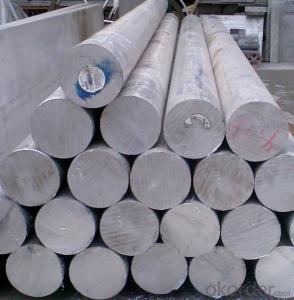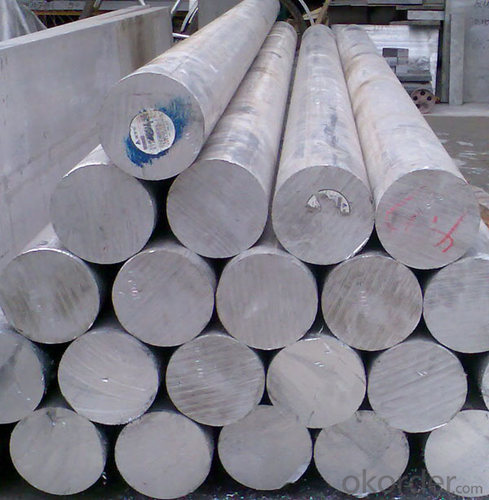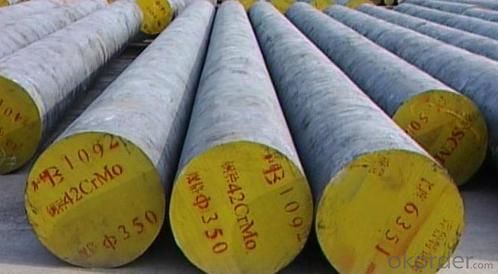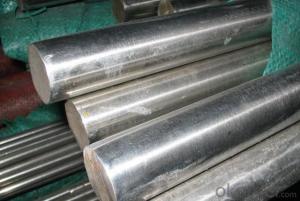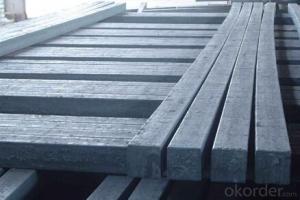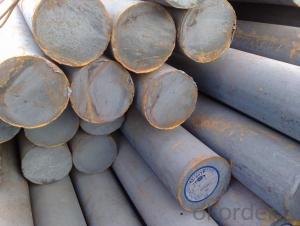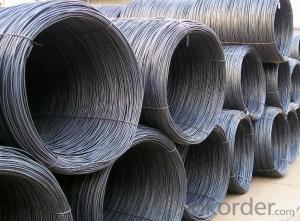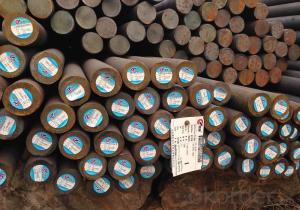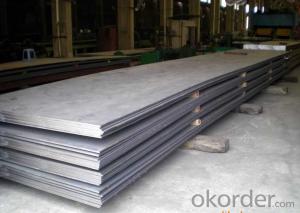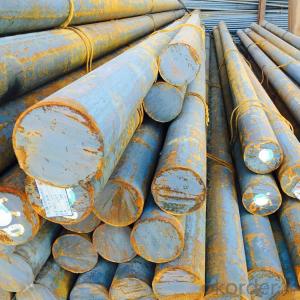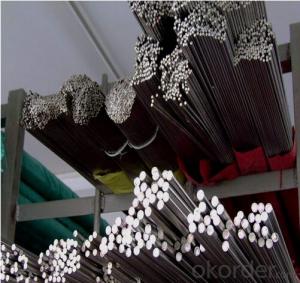Steel SCr440 Mild Carbon Steel Special Steel
- Loading Port:
- China main port
- Payment Terms:
- TT OR LC
- Min Order Qty:
- 25 m.t.
- Supply Capability:
- 10000 m.t./month
OKorder Service Pledge
OKorder Financial Service
You Might Also Like
Specification
1.round steel
2.ISO9001:2008 certificate
3.Competive price and Best quality
4.On-time delivery
Chemical Composition(GB)%
| C | Si | Mn | Cr | Ni |
| 0.37-0.44 | 0.17-0.37 | 0.50-0.80 | 0.80-1.10 | ≤0.30 |
Heat Treatment
| Item | Temperature ℃ | Hardness |
| Normalizing | 850-870 | 179-229HB |
Characterstics: Which has the best comprehensive mechanical properties
Applications
| 1.Can be used for drawing die and plastic mould | |||
| 2.Can be used for middle and small punch |
Product show:

Workshop show:

FAQ:
1, Your advantages?
professional products inquiry, products knowledge train (for agents), smooth goods delivery, excellent customer solution proposale
2, Test & Certificate?
SGS test is available, customer inspection before shipping is welcome, third party inspection is no problem
3, Payment Terms?
30% TT as deposit and 70% before delivery.
Irrevocable L/C at sight.
4, Trading Terms?
EXW, FOB, CIF, FFR, CNF
5, After-sale Service?
We provides the services and support you need for every step of our cooperation. We're the business partner you can trust.
For any problem, please kindly contact us at any your convenient time.
We'll reply you in our first priority within 24 hours.
- Q: What are the common applications of special steel in the manufacturing industry?
- Special steel is commonly used in the manufacturing industry for a variety of applications including the production of tools, machinery parts, automotive components, construction materials, and aerospace equipment. Its high strength, durability, corrosion resistance, and heat resistance make it ideal for demanding environments and critical applications where regular steel may not suffice.
- Q: How does the carbon content affect the properties of special steel?
- The carbon content plays a crucial role in determining the properties of special steel. Higher carbon content tends to enhance its hardness, strength, and wear resistance. This is because carbon forms interstitial solid solutions with iron, creating stronger and more stable iron carbides. On the other hand, lower carbon content leads to increased ductility and toughness. The carbon content also influences the steel's ability to be heat-treated, affecting its response to processes like quenching and tempering. Therefore, controlling the carbon content allows manufacturers to tailor the properties of special steel to meet specific application requirements.
- Q: What are the common challenges in welding special steel?
- Some common challenges in welding special steel include controlling heat input, preventing distortion and cracking, ensuring proper fusion, and managing the formation of undesirable microstructures. Special steels often have specific alloy compositions and properties that make them more sensitive to heat and more prone to cracking. Therefore, precise control of welding parameters, preheating, and post-weld heat treatment are crucial to overcome these challenges and achieve high-quality welds in special steel.
- Q: How is special steel used in the production of automotive springs?
- Automotive springs, including suspension springs and valve springs, require special steel due to its unique properties that make it perfect for this purpose. Special steel, also called alloy steel, is specifically designed to have superior mechanical properties compared to regular steel. By adding alloying elements like chromium, nickel, or molybdenum, its strength, hardness, and resistance to wear and fatigue are improved. When it comes to producing automotive springs, special steel is used to create springs capable of withstanding the demanding conditions of the vehicle's suspension system. These springs must not only absorb and distribute the vehicle's weight but also provide a smooth and comfortable ride. The exceptional strength of special steel allows automotive springs to handle heavy loads without deforming or breaking. This is crucial for maintaining vehicle stability and safety, especially on rough roads or when carrying heavy loads. Furthermore, special steel's fatigue resistance is vital in the production of automotive springs. Over the vehicle's lifespan, these springs undergo millions of compression and expansion cycles. The fatigue resistance of special steel ensures that the springs can maintain their performance and reliability over an extended period. Moreover, special steel's resistance to wear and corrosion is highly advantageous in automotive applications. Springs are exposed to various environmental elements like moisture, dirt, and chemicals, which can cause corrosion and deterioration. The corrosion resistance of special steel helps prolong the lifespan of automotive springs and maintains their functionality. In conclusion, the use of special steel in manufacturing automotive springs guarantees that these crucial components can endure heavy loads, repetitive stress, and high temperatures. Its superior mechanical properties, including strength, fatigue resistance, and corrosion resistance, make it the ideal material for automotive springs, enhancing the overall performance and durability of vehicles.
- Q: How is special steel used in the textile industry?
- Special steel is used in the textile industry for various purposes such as manufacturing machinery components, needles, and cutting tools. It provides durability, strength, and resistance to wear and tear, ensuring the efficient operation of textile machinery and improving the overall production process. Additionally, special steel is utilized in the production of textile blades, which are crucial for precision cutting and shaping of fabrics.
- Q: How does special steel contribute to the infrastructure development?
- Special steel is a crucial component in infrastructure development as it offers enhanced strength, durability, and resistance to extreme conditions. It is used in the construction of bridges, buildings, pipelines, and other critical structures, ensuring their longevity and safety. Additionally, special steel's versatility allows for the creation of innovative designs, facilitating the construction of complex and efficient infrastructure systems.
- Q: How does the hardness of special steel affect its machinability?
- The hardness of special steel has a direct impact on its machinability. Generally, as the hardness of steel increases, its machinability decreases. Harder steel is more difficult to cut, shape, and form due to its increased resistance to deformation. Consequently, machining operations, such as drilling, milling, or turning, become more challenging and require specialized tools and techniques to achieve the desired results.
- Q: How does special steel contribute to the elasticity of products?
- Special steel contributes to the elasticity of products by providing a high level of tensile strength and flexibility. Its unique composition and manufacturing process allow it to withstand stress and deformation without breaking, allowing products to return to their original shape after being bent or stretched. This characteristic is crucial in various industries, such as automotive, aerospace, and construction, where the elasticity of products is essential for safety, durability, and performance.
- Q: How does special steel contribute to the aerospace noise reduction?
- Special steel contributes to aerospace noise reduction in several ways. Firstly, it is used in the construction of aircraft engine components such as fan blades and turbine discs. These components are subject to high temperatures and pressure, and special steel helps maintain their structural integrity, reducing vibration and noise. Secondly, special steel is also used in the manufacturing of aircraft fuselage and wings, where it helps dampen vibrations caused by aerodynamic forces, thus reducing noise. Additionally, special steel can be used in the production of sound-absorbing materials, which are used to line the interior of aircraft cabins, further reducing noise levels and improving passenger comfort. Overall, the use of special steel in various aerospace applications plays a crucial role in minimizing noise and improving the overall acoustic performance of aircraft.
- Q: How is special steel protected against corrosion?
- Special steel is protected against corrosion through various methods such as coating it with corrosion-resistant materials like zinc, nickel, or chromium, using cathodic protection techniques, applying protective paints or sealants, and employing proper maintenance practices like regular cleaning and inspections.
Send your message to us
Steel SCr440 Mild Carbon Steel Special Steel
- Loading Port:
- China main port
- Payment Terms:
- TT OR LC
- Min Order Qty:
- 25 m.t.
- Supply Capability:
- 10000 m.t./month
OKorder Service Pledge
OKorder Financial Service
Similar products
Hot products
Hot Searches
Related keywords
